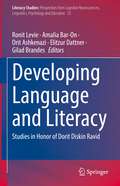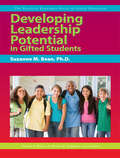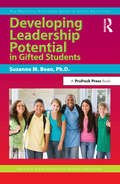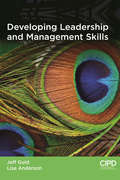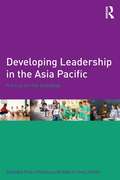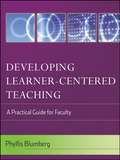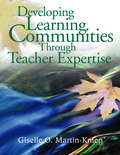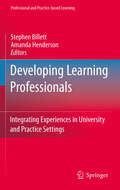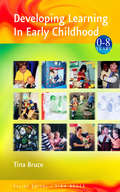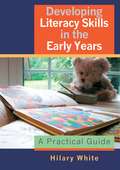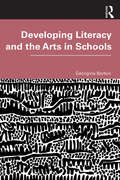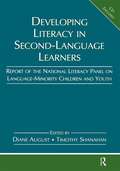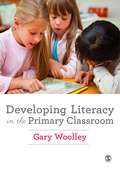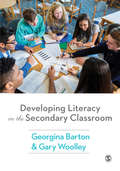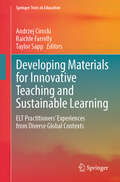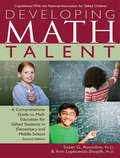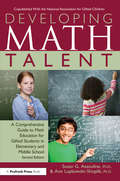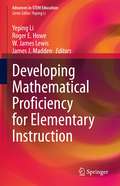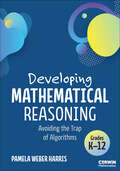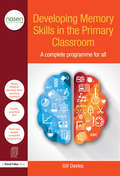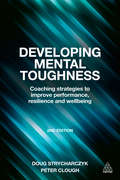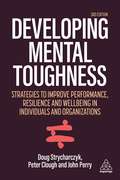- Table View
- List View
Developing Language and Literacy: Studies in Honor of Dorit Diskin Ravid (Literacy Studies #23)
by Ronit Levie Amalia Bar-On Orit Ashkenazi Elitzur Dattner Gilad BrandesThis volume dedicated to Dorit Ravid, offers 29 new chapters on the multiple facets of spoken and written language learning and usage from a group of illustrious scholars and scientists, focusing on typologically different languages and anchored in a variety of communicative settings. The book encompasses five interrelated yet distinct topics. One set of studies is in the field of developmental psycholinguistics, covering the acquisition of lexical and grammatical categories from toddlerhood to adolescence. A second topic involves a section of studies on the interface of cognition and language, with chapters on processing, production, comprehension, teaching and learning language in usage and in historical perspective. A third topic involves a theoretical and applied perspectives on the acquisition and development of literacy competence, including reading, writing, spelling and text production. A fourth topic brings together an array of studies on social, environmental and clinical diversity in language, highlighting novel issues in multilingualism, immigration, language and literacy disorders. Finally, a section of the volume examines in depth questions in Modern Hebrew linguistics, as the home language and launching base of Dorit Ravid’s research work.
Developing Leadership Potential in Gifted Students
by Suzanne M. BeanAlthough the concept of leadership is often studied, researched, and discussed, the art of leadership is still misunderstood, debated, and often neglected. It is known, however, that leadership skills can be developed and more intentional endeavors must be made to cultivate bright, young leaders for the future. Developing Leadership Potential in Gifted Students offers insight into developing leadership skills in gifted students and provides definitions and theories of leadership, looks at trends and changing paradigms, and suggests screening and identification tools for leadership as well as instructional programs and materials to incorporate into the regular curriculum. This is one of the books in Prufrock Press' popular Practical Strategies Series in Gifted Education. The series offers 25 timesaving books on critical topics for educating gifted learners. Filled with practical information and advice, these books are ideal for classroom teachers, preservice teachers, and graduate students. In preparing this series, the authors have kept the busy classroom teacher in mind. The result is a timesaving introduction to the most important issues in gifted education.
Developing Leadership Potential in Gifted Students: The Practical Strategies Series in Gifted Education
by Suzanne M. Bean Kristen R. Stephens Frances KarnesAlthough the concept of leadership is often studied, researched, and discussed, the art of leadership is still misunderstood, debated, and often neglected. It is known, however, that leadership skills can be developed and more intentional endeavors must be made to cultivate bright, young leaders for the future. Developing Leadership Potential in Gifted Students offers insight into developing leadership skills in gifted students and provides definitions and theories of leadership, looks at trends and changing paradigms, and suggests screening and identification tools for leadership as well as instructional programs and materials to incorporate into the regular curriculum.This is one of the books in Prufrock Press' popular Practical Strategies Series in Gifted Education. The series offers 25 timesaving books on critical topics for educating gifted learners. Filled with practical information and advice, these books are ideal for classroom teachers, preservice teachers, and graduate students. In preparing this series, the authors have kept the busy classroom teacher in mind. The result is a timesaving introduction to the most important issues in gifted education.
Developing Leadership and Management Skills
by Lisa Anderson Jeffrey GoldDeveloping Leadership and Management Skills is essential reading for anyone studying the Level 5 CIPD L&D module of the same name as well as all learning and development professionals looking to develop the skills of leaders and managers in their organisation. With a thorough grounding in scientific management, leadership theories and the similarities and differences between leaders and managers, reader will fully understand the distinction between the two roles. There is also comprehensive coverage of the role of L&D in developing leaders and managers including designing learning interventions, using e-learning and blending learning, talent development, succession planning and employee engagement. Developing Leadership and Management Skills also includes guidance on how L&D professionals can ensure ownership and success of leadership and management development programmes. This includes indicators of success, individualised interventions and how to demonstrate and communicate achievement of success ensuring that L&D professionals have all the tools they need to effectively develop leaders and managers in their organisation.
Developing Leadership in the Asia Pacific: A focus on the individual
by Shane N. Phillipson Sivanes PhillipsonDeveloping Leadership in the Asia-Pacific focuses on the design of leadership programs that are able to meet the needs of students, teachers and the wider community. Rather than taking an all-encompassing approach that cover all contexts of leadership development, this book is based on research that guides the leadership teacher in designing a course that takes into account the specific context and needs of individual students, the purpose of the course, and how the course can be evaluated for its effectiveness. Emphasising learner diversity, the book argues that the students’ specific cultural and educational contexts need to be taken into account when designing leadership programs. Although these courses are often taught outside of the regular curriculum, components of leadership can be found in the regular curriculum. Accordingly, this book helps the leadership teacher to integrate the leadership program with the regular curriculum through the use of guiding questions, quizzes, case studies, dilemmas, and other pedagogical strategies. It links research with practice, scaffolding teachers in understanding the content or issues described in each chapter, assisting them in building a fully defensible leadership program. A number of real life worked examples are also provided throughout each chapter as a practicable framework that can be used in teaching design for everyday units of work. This book is a useful reference for researchers working in leadership as well as an essential tool for teachers developing leadership programs for students in primary, secondary or tertiary contexts.
Developing Learner-Centered Teaching: A Practical Guide for Faculty
by Maryellen Weimer Phyllis BlumbergDeveloping Learner-Centered Teaching offers a step-by-step plan for transforming any course from teacher-centered to the more engaging learner-centered model. Filled with self-assessments and worksheets that are based on each of the five practices identified in Maryellen Weimer's Learner-Centered Teaching, this groundbreaking book gives instructors, faculty developers, and instructional designers a practical and effective resource for putting the learner-centered model into action.
Developing Learning Communities Through Teacher Expertise
by Dr Giselle O. Martin-KniepLearn practical methods for developing a collaborative environment where teachers and administrators work together to enhance teachers' practices, increase student learning, and produce valuable school processes.
Developing Learning Professionals
by Stephen Billett Amanda J. HendersonIn higher education institutions across the globe, there is a growing interest in integrating classroom learning with experience in practice settings. This interest is the result of an increased emphasis on courses that prepare students for specific occupations in the hopes that upon graduation students will be job-ready. Developing Learning Professionals: Integrating Experiences in University and Practice Settings explores how the integration of student experiences across university and practice settings might best be used to produce college graduates who are adept, critical practitioners. To do so, it draws on the findings of a series of projects in Australia that investigated diverse aspects of work-related learning. Through these projects, a range of scholars and researchers consider different aspects of this educational initiative within the same national higher education context. They address pedagogic and curriculum practices, institutional arrangements and partnerships of varying kinds, and a consolidated set of perspectives.
Developing Learning in Early Childhood (Zero to Eight)
by Tina Bruce`This book is useful for students and lecturers of early childhood. It provides concise overviews of relevant research of early childhood development, theories of play and can be utilised as a contemporary, reference book by a range of professionals' - Debate `The chapter on young children becoming symbol users make a valuable contribution to the literature, and I shall be inspired and haunted in equal measure by the plea that epitomises this book and its story' - Marian Whitehead, Early Years `It's an excellent and easy-to-read text to read, blending theory and research with practice. Each chapter format is clear, with the key themes outlined at the beginning the main body, followed by useful and thought-provoking questions for good practice to ponder and relevant further reading at the end' - Nursery World ` Tina Bruce clearly loves children and delights in their development. She has produced an academic work which is both sensitive and stimulating but decidedly unpreachy' - Kirsty Wark, Broadcaster This book shows how adults can support children and actively help them develop their learning in early childhood. Drawing on traditional approaches as well as recent research and theories, Tina Bruce shows the need for balance in early years education and care between the biological and socio-cultural aspects of the development of learning. The book includes a wide range of examples from practitioners, including nursery teachers, health visitors, and community workers. Features include: - what does it mean to develop learning ? - learning by doing real things - how language helps - creativity and imagination - diversity and inclusion. This book is essential for students, practitioners and tutors of Foundation Degrees and Early Childhood Studies Degrees. The 0-8 series edited by Tina Bruce, deals with essential themes in early childhood, which concern practitioners, parents and children. Titles in the 0-8 series Marian Whitehead: Developing Language and Literacy with Young Children Second Edition Rosemary Roberts: Self-Esteem and Early Learning Second Edition Cath Arnold: Child Development and Learning 2-5 - Georgia's Story Pat Gura: Resources for Early Learning Chris Pascal and Tony Bertram: Effective Early Learning: Case Studies in Improvement Mollie Davies: Movement and Dance Second Edition John Mathews: Drawing and Painting Second Edition
Developing Literacy Skills in the Early Years: A Practical Guide
by Hilary White'I found this book to be very useful and would recommend it to all infant teachers, especially those working with children with special needs. . . It gave me plenty of new ideas, and would be especially helpful to newly trained teachers' - REACH Many young children need targeted support and encouragement to help develop their literacy skills. This book contains tried and tested activities to improve listening, verbal reasoning and language skills in young children and shows you how to turn theory into fun, practical ideas for the classroom. The author shows how to link activities to the Early Learning Goals and the National Literacy Strategy and the book includes: - lesson activities using puppets, nursery rhymes, story boxes and picture books; - suggestions for using role-play; - ideas for organising your play setting to encourage literacy-related play; - lesson plans; - assessment guidelines; - lists of resources; - a selection of photocopiable material. This book is a valuable resource for those working with children aged 3 to 8 and those working in playgroups, day nurseries, nursery schools and reception classes will find it particularly useful. It suggests ways to improve young children's literacy skills and can also be used as an INSET resource to share with the whole staff. Hilary White is a freelance writer, consultant and teacher. She lectured for many years in an early years training college.
Developing Literacy and the Arts in Schools
by Georgina BartonThe teaching of the arts and literacy in schools is often at odds with one another. The desire for schools to improve results on high-stakes testing can lead to a narrow view of literacy rather than one that acknowledges the unique and distinct literacies that exist in other curriculum areas including the arts. With methods of communication becoming increasingly complex, it will be more and more important for students to be able to utilise all semiotic modes. Developing Literacy and the Arts in Schools investigates this key issue in education and offers a solution to the negative relationship between the arts and literacy. Drawing on interview data and evidence from diverse classrooms, it explores the pedagogies of effective arts practitioners and teachers, and how they relate to theoretical frameworks, to unpack the key elements of effective practice related to literacy and the arts. A model of arts-literacies is provided to assist arts and literacy educators in developing a common language that acknowledges and values these distinct arts-literacies. Themes of multimodality, diversity, aesthetics and reflection in relation to the arts and literacy are foregrounded throughout. This book will be of great value to postgraduate students of Education specialising in arts and literacy, education academics, teacher educators, and classroom and preservice teachers.
Developing Literacy in Second-Language Learners: Report of the National Literacy Panel on Language-Minority Children and Youth
by Timothy Shanahan Diane AugustThis volume reports the findings of the National Literacy Panel on Language-Minority Children and Youth. The formal charge to the panel—a distinguished group of expert researchers in reading, language, bilingualism, research methods, and education—was to identify, assess, and synthesize research on the education of language-minority children and youth with respect to their attainment of literacy. Funding for the project was provided to the Center for Applied Linguistics and SRI International by the U.S. Department of Education’s Institute of Education Sciences and the Office of English Language Acquisition, with additional funding from the National Institute of Child Health and Human Development provided through the U.S. Department of Education. The authors review the state of knowledge on the development of literacy in language-minority children and youth, organized around five specific themes:*Development of Literacy in Second-Language Learners;*Cross-linguistic Relationships in Second-Language Learners;*Sociocultural Contexts and Literacy Development*Educating Language-Minority Students: Instruction and Professional Development; and*Student Assessment Each part begins with a synthesis chapter that spells out the research questions for the chapters in that part, provides background information, describes the methodology used, summarizes the empirical findings reported, addresses methodological issues, and makes recommendations for future research. The following chapters provide more detail on the individual studies reviewed for specific research questions. The volume includes two opening chapters, “Introduction and Methodology” and “Demographic Overview”; a closing chapter that summarizes the report, identifies cross-cutting themes, and makes recommendations for future research; and a CD-ROM providing a searchable database of research references. The audiences for this volume include researchers interested in the development of literacy in language-minority children and youth as well as those studying literacy more generally, and those concerned with improving the education of this population of students.
Developing Literacy in the Primary Classroom
by Gary WoolleyPrimary literacy involves many different learning processes, which can make it challenging to teach, particularly in diverse classroom environments. Combining an examination of theory and research with practical case studies and real examples of teaching practice, this book shows trainee and early career teachers how to engage and motivate children to develop a range of primary English skills. Chapters incorporate broader aspects of primary teaching such as active learning, self-regulation and assessment, and activities and discussion points explore how to apply important principles to your own teaching. Drawing from international research and aware of policy developments in different countries, the book covers key topics on primary teacher education courses, including: The foundations of reading, writing and oracy skills Planning, assessment and classroom organisation Using new technologies and social media as tools for learning Engaging with the literacy needs of diverse learners. This is essential reading for students on university-based and school-based courses preparing to teach in primary education, and early career teachers seeking to continue their professional learning. Dr Gary Woolley is senior lecturer at the University of the Sunshine Coast, Australia.
Developing Literacy in the Primary Classroom
by Gary WoolleyPrimary literacy involves many different learning processes, which can make it challenging to teach, particularly in diverse classroom environments. Combining an examination of theory and research with practical case studies and real examples of teaching practice, this book shows trainee and early career teachers how to engage and motivate children to develop a range of primary English skills. Chapters incorporate broader aspects of primary teaching such as active learning, self-regulation and assessment, and activities and discussion points explore how to apply important principles to your own teaching. Drawing from international research and aware of policy developments in different countries, the book covers key topics on primary teacher education courses, including: The foundations of reading, writing and oracy skills Planning, assessment and classroom organisation Using new technologies and social media as tools for learning Engaging with the literacy needs of diverse learners. This is essential reading for students on university-based and school-based courses preparing to teach in primary education, and early career teachers seeking to continue their professional learning. Dr Gary Woolley is senior lecturer at the University of the Sunshine Coast, Australia.
Developing Literacy in the Secondary Classroom
by Gary Woolley Georgina BartonToday’s secondary classrooms are increasingly diverse places and skilled English teachers need to be able to develop flexible teaching strategies that can be adapted to best serve diverse learners with divergent needs. This textbook for pre-service teachers gives them pragmatic guidance on the major aspects of literacy teaching, and how to draw insight research and apply it in diverse classrooms. Key coverage includes: · The fundamental aspects of teaching reading and writing to adolescent learners. · How to intelligently select and use literature with secondary students. · Multi-literacies and the use of technology in English teaching. · Assessment strategies for the classroom. · Teaching techniques for developing reading comprehension. This is essential reading for anyone training to teach English in secondary classrooms, and for recently qualified teachers looking to sharpen their practice.
Developing Literacy in the Secondary Classroom
by Gary Woolley Georgina BartonToday’s secondary classrooms are increasingly diverse places and skilled English teachers need to be able to develop flexible teaching strategies that can be adapted to best serve diverse learners with divergent needs. This textbook for pre-service teachers gives them pragmatic guidance on the major aspects of literacy teaching, and how to draw insight research and apply it in diverse classrooms. Key coverage includes: · The fundamental aspects of teaching reading and writing to adolescent learners. · How to intelligently select and use literature with secondary students. · Multi-literacies and the use of technology in English teaching. · Assessment strategies for the classroom. · Teaching techniques for developing reading comprehension. This is essential reading for anyone training to teach English in secondary classrooms, and for recently qualified teachers looking to sharpen their practice.
Developing Materials for Innovative Teaching and Sustainable Learning: ELT Practitioners’ Experiences from Diverse Global Contexts (Springer Texts in Education)
by Andrzej Cirocki Raichle Farrelly Taylor SappThis volume features current, innovative, and effective ways of developing instructional materials for diverse English Language Teaching (ELT) contexts. It is divided into four sections, each featuring pedagogical materials designed for specific groups of learners. The sections focus on materials for general English, ESP and EAP, CLIL, and ELT teacher education courses. The chapters, written by experienced educators from around the world, are highly practical and detail the process of designing materials for innovative and sustainable language education. The contributors reflect on their own practice, describe the materials design process, explain the guiding principles, and connect the design process with the local context and educational policies. They also offer practical tips to inspire classroom practitioners to create their own materials, promoting innovative teaching and sustainable learning. Ultimately, their chapters aim to encourage a world where teaching involves creativity and adaptability, leading to transformative learning for both teachers and learners.
Developing Math Talent
by Ann Lupowski-Shoplik Susan G. AssoulineBuild student success in math with the only comprehensive guide for developing math talent among advanced learners. The authors, nationally recognized math education experts, offer a focused look at educating gifted and talented students for success in math. More than just a guidebook for educators, this book offers a comprehensive approach to mathematics education for gifted students of elementary or middle school age.
Developing Math Talent: A Comprehensive Guide to Math Education for Gifted Students in Elementary and Middle School
by Susan G. Assouline Ann Lupkowski-ShoplikBuild student success in math with the only comprehensive guide for developing math talent among advanced learners. The authors, nationally recognized math education experts, offer a focused look at educating gifted and talented students for success in math. More than just a guidebook for educators, this book offers a comprehensive approach to mathematics education for gifted students of elementary or middle school age.The authors provide concrete suggestions for identifying mathematically talented students, tools for instructional planning, and specific programming approaches. Developing Math Talent features topics such as strategies for identifying mathematically gifted learners, strategies for advocating for gifted children with math talent, how to design a systematic math education program for gifted students, specific curricula and materials that support success, and teaching strategies and approaches that encourage and challenge gifted learners.
Developing Mathematical Proficiency for Elementary Instruction (Advances in STEM Education)
by Yeping Li W. James Lewis James J. Madden Roger E. HoweThe need to improve the mathematical proficiency of elementary teachers is well recognized, and it has long been of interest to educators and researchers in the U.S. and many other countries. But the specific proficiencies that elementary teachers need and the process of developing and improving them remain only partially conceptualized and not well validated empirically. To improve this situation, national workshops were organized at Texas A&M University to generate focused discussions about this important topic, with participation of mathematicians, mathematics educators and teachers. Developing Mathematical Proficiency for Elementary Instruction is a collection of articles that grew out of those exciting cross-disciplinary exchanges. Developing Mathematical Proficiency for Elementary Instruction is organized to probe the specifics of mathematical proficiency that are important to elementary teachers during two separate but inter-connected professional stages: as pre-service teachers in a preparation program, and as in-service teachers teaching mathematics in elementary classrooms. From this rich and inspiring collection, readers may better understand, and possibly rethink, their own practices and research in empowering elementary teachers mathematically and pedagogically, as educators or researchers.
Developing Mathematical Reasoning: Avoiding the Trap of Algorithms (Corwin Mathematics Series)
by Pamela Weber HarrisMath is not rote-memorizable. Math is not random-guessable. Math is figure-out-able. Author Pam Harris argues that teaching real math—math that is free of distortions–will reach more students more effectively and result in deeper understanding and longer retention. This book is about teaching undistorted math using the kinds of mental reasoning that mathematicians do. Memorization tricks and algorithms meant to make math "easier" are full of traps that sacrifice long-term student growth for short-lived gains. Students and teachers alike have been led to believe that they’ve learned more and more math, but in reality their brains never get any stronger. Using these tricks may make facts easier to memorize in isolation, but that very disconnect distorts the reality of math. The mountain of trivia piles up until students hit a breaking point. Humanity′s most powerful system of understanding, organizing, and making an impact on the world becomes a soul-draining exercise in confusion, chaos, and lost opportunities. Developing Mathematical Reasoning: Avoiding the Trap of Algorithms emphasizes the importance of teaching students increasingly sophisticated mathematical reasoning and understanding underlying concepts rather than relying on a set rule for solving problems. This book illuminates a hierarchy of mathematical reasoning to help teachers guide students through various domains of math development, from basic counting and adding to more complex proportional and functional reasoning. Everyone is capable of understanding and doing real math. This book: Highlights the important mathematical relationships, strategies, and models for students to develop Offers personal stories, reflection sections, and extensive practical exercises for easy implementation Includes real math—a lot of it—to provide teachers with examples they can put to use in their classrooms immediately This book is a valuable resource for educators looking to reach more students by building a strong foundation of mathematical thinking in their students. By addressing common misconceptions about math and providing practical strategies for teaching real math, this book shows that everyone can use the mathematical relationships they already know to reason about new relationships. In other words, everyone can math.
Developing Mathematical Reasoning: Avoiding the Trap of Algorithms (Corwin Mathematics Series)
by Pamela Weber HarrisMath is not rote-memorizable. Math is not random-guessable. Math is figure-out-able. Author Pam Harris argues that teaching real math—math that is free of distortions–will reach more students more effectively and result in deeper understanding and longer retention. This book is about teaching undistorted math using the kinds of mental reasoning that mathematicians do. Memorization tricks and algorithms meant to make math "easier" are full of traps that sacrifice long-term student growth for short-lived gains. Students and teachers alike have been led to believe that they’ve learned more and more math, but in reality their brains never get any stronger. Using these tricks may make facts easier to memorize in isolation, but that very disconnect distorts the reality of math. The mountain of trivia piles up until students hit a breaking point. Humanity′s most powerful system of understanding, organizing, and making an impact on the world becomes a soul-draining exercise in confusion, chaos, and lost opportunities. Developing Mathematical Reasoning: Avoiding the Trap of Algorithms emphasizes the importance of teaching students increasingly sophisticated mathematical reasoning and understanding underlying concepts rather than relying on a set rule for solving problems. This book illuminates a hierarchy of mathematical reasoning to help teachers guide students through various domains of math development, from basic counting and adding to more complex proportional and functional reasoning. Everyone is capable of understanding and doing real math. This book: Highlights the important mathematical relationships, strategies, and models for students to develop Offers personal stories, reflection sections, and extensive practical exercises for easy implementation Includes real math—a lot of it—to provide teachers with examples they can put to use in their classrooms immediately This book is a valuable resource for educators looking to reach more students by building a strong foundation of mathematical thinking in their students. By addressing common misconceptions about math and providing practical strategies for teaching real math, this book shows that everyone can use the mathematical relationships they already know to reason about new relationships. In other words, everyone can math.
Developing Memory Skills in the Primary Classroom: A complete programme for all (nasen spotlight)
by Gill DaviesHow can we help children to develop their working memory? The memory demands in the classroom for children are high; they are constantly bombarded by new knowledge in multiple topic areas, given series of instructions to complete and expected to both learn and demonstrate their mastery of knowledge and skills on a daily basis. Developing Memory Skills in the Primary Classroom is a highly practical book that contains all the guidance and resources a school needs to boost their pupils’ working memory. Proven to have a positive impact on pupils, this tried and tested complete programme combines teaching pupils memory strategies with opportunities to practice those strategies within a small group, the classroom and at home. The resources provided by this book include: a variety of photocopiable games and activities extensive teaching notes a range of sample letters to parents/carers essential information sheets bespoke baseline assessment tools a detailed programme that can be run by a teaching assistant under the guidance of the SENCo. This text provides a clear link between working in the classroom and with parents in the home, making it a one-stop resource for any teacher, SENCo, teaching assistant or parent wanting to help children develop their working memory.
Developing Mental Toughness
by Peter Clough Doug StrycharczykMental toughness is about how effectively individuals respond to stress, pressure and challenge. It is rooted in the notion of resilience but moves beyond this by being highly applicable and measurable. Understanding this concept is essential to improving performance for both the individual and organization, and this ground-breaking book explains mental toughness clearly and effectively. Tracing its development from sports psychology into the world of business, health and education, Developing Mental Toughness was the first book to look at applications at the organizational level and to provide a reliable psychometric measure. The new edition includes greater coverage of how mental toughness relates to other behaviours and can be applied to leadership, creativity, emotional intelligence, and motivation. It also looks at its applications in employability and entrepreneurship, and there will be expanded coverage of coaching for mental toughness. Written for anyone coaching individuals and teams for improved performance, the book contains practical guidance and techniques, exercises, case studies and the Mental Toughness self-assessment tool.
Developing Mental Toughness: Strategies to Improve Performance, Resilience and Wellbeing in Individuals and Organizations
by John Perry Peter Clough Doug StrycharczykHow can individuals and organizations understand and measure mental toughness to deal with stress and challenge, and so improve performance? This fully updated third edition of Developing Mental Toughness provides the answers to unlock this potential.Tracing its development from sports psychology into the business sector, Developing Mental Toughness provides a reliable psychometric measure to apply at the organizational level. With coverage on how mental toughness relates to other behaviours and can be applied to employability, leadership, performance, creativity, emotional intelligence and motivation, the practical guidance and exercises in this book make it essential reading for academics, managers and coaches alike.This third edition includes an expansion of the 4Cs model to include concepts on learning orientation and resilience and new chapters on evidence-based practice and using the Mental Toughness Questionnaire (MTQ48) to gain richer self-awareness. Featuring case studies from Deloitte and Ethiad, Developing Mental Toughness is the practical coaching guide for developing capabilities and resilience.
